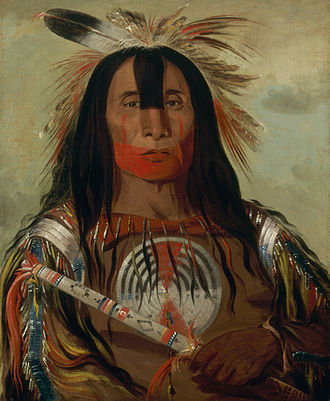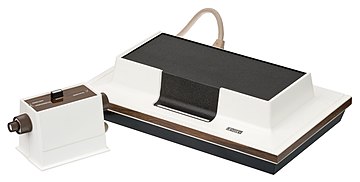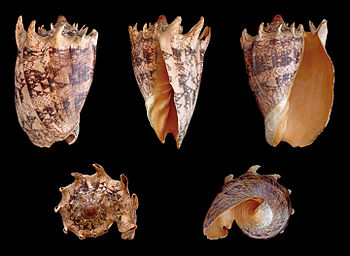|
Featured picture tools: |
These featured pictures, as scheduled below, appeared as the picture of the day (POTD) on the English Wikipedia's Main Page in September 2015. Individual sections for each day on this page can be linked to with the day number as the anchor name (e.g. [[Wikipedia:Picture of the day/September 2015#1]] for September 1).
You can add an automatically updating POTD template to your user page using {{Pic of the day}} (version with blurb) or {{POTD}} (version without blurb). For instructions on how to make custom POTD layouts, see Wikipedia:Picture of the day.Purge server cache
September 1

|
Ethel Waters (1896–1977) was an American blues, jazz, and gospel vocalist and actress. She began her career in the 1920s singing blues, but later frequently performed jazz, big band, and pop music, on the Broadway stage and in concerts. In 1949 Waters was nominated for an Academy Award, the second African American (after Hattie McDaniel) to receive such a nomination. In 1962 she became the first African-American woman to be nominated for an Emmy Award. Her recordings include "Dinah", "Stormy Weather", "Taking a Chance on Love", "Heat Wave", and "Cabin in the Sky" . Photograph: William P. Gottlieb; restoration: Adam Cuerden
Recently featured:
|
September 2

|
The Inca tern (Larosterna inca) is a species of seabird in the family Sternidae and the only member of its genus. This piscivorous species is restricted to the Humboldt Current and breeds on the rocky coastal cliffs in Peru and Chile, laying one or two eggs which hatch after 4 weeks. Photograph: Olaf Oliviero Riemer
Recently featured:
|
September 3

|
|
Alatskivi Castle is a Neo-Gothic castle in Alatskivi, Estonia. Dating to the 17th century, it is situated in Alatskivi Parish, Tartu County. It was rebuilt in the late 19th century by Baron Arved von Nolcken, modeled on the royal residence of Balmoral in Scotland. A renovation occurred between 2005 and 2011. Five rooms on the first floor house the Eduard Tubin museum, which documents his accomplishments as a music composer and conductor. Photograph: Ivar Leidus
Recently featured:
|
September 4

|
Bacchus and Ariadne is an oil painting on canvas completed by Titian between 1522 and 1523. One of a cycle of paintings on mythological subjects produced for Alfonso d'Este, the Duke of Ferrara, it depicts the god Bacchus falling in love with Ariadne after she has been deserted by her lover Theseus. Behind Bacchus is a procession of revelers in a chariot drawn by two cheetahs. The painting now hangs in the National Gallery in London. Painting: Titian
Recently featured:
|
September 5

|
The maxima clam (Tridacna maxima) is a species of bivalve found throughout the Indo-Pacific. It is found on the surface of reefs or sand, or partly embedded in coral (as with this specimen), in the oceans surrounding east Africa, India, China, Australia, Southeast Asia and the islands of the Pacific. This clam is much sought after in the aquarium trade, as its often striking coloration—the result of crystalline pigment—mimics that of the true giant clam. Photograph: Alexander Vasenin
Recently featured:
|
September 6

|
|
The Solovetsky Monastery is a Russian Orthodox monastery in Solovetsky, Arkhangelsk, Russia. Founded in 1436 by the monk Zosima, the monastery grew in power into the 16th century, becoming an economic and political center of the White Sea region and eventually hosting 350 monks. After the Bolshevik Revolution, Soviet authorities closed down the monastery and incorporated many of its buildings into Solovki prison camp, one of the earliest forced-labor camps of the gulag system. The camp closed after the region's trees had been harvested. Today the monastery has been re-established, and also serves as a museum. Photograph: Linazet
Recently featured:
|
September 7

|
The Albanian water frog (Pelophylax shqipericus) is a species of true frog in the family Ranidae. It is native to Albania and Montenegro, where it lives in aquatic environments. The frogs are medium-sized. Males sometimes bear a distinctive bright green stripe down the length of the backbone, but otherwise are green to light brown in overall colouring with large black or dark brown spots. Females are olive green or light brown in colour and also bear brown or black large spots. The species is endangered and known populations are currently in decline. Photograph: Benny Trapp
Recently featured:
|
September 8

|
Peter Sellers (1925–1980) was a British film actor, comedian and singer. He performed in the BBC Radio comedy series The Goon Show, featured on a number of hit comic songs and became known to a world-wide audience through his many film characterisations, among them Chief Inspector Clouseau in The Pink Panther series of films. Sellers's versatility enabled him to portray a wide range of comic characters using different accents and guises, and he would often assume multiple roles within the same film, frequently with contrasting temperaments and styles, as in Dr. Strangelove. Satire and black humour were major features of many of his works, and his performances had a strong influence on a number of later comedians. Photograph: Allan Warren; edit: Keraunoscopia
Recently featured:
|
September 9

|
A gnomonic projection of a portion of the northern hemisphere, centered on the geographic North Pole. Such projections display all great circles as straight lines, resulting in any line segment on a gnomonic map showing the shortest route between the segment's two endpoints. Map: Strebe, using Geocart
Recently featured:
|
September 10

|
Buffalo Bull's Back Fat was chief of the Kainai Nation, one of the three tribes which make up the Blackfoot Confederacy, during the early 19th century. This portrait of him was completed at Fort Union in 1832 by George Catlin and is now held by the Smithsonian American Art Museum. Painting: George Catlin
Recently featured:
|
September 11

|
Corals are marine invertebrates that typically live in compact colonies of many identical individual polyps. Each polyp is a sac-like animal typically only a few millimeters in diameter and a few centimeters in length. Corals are major contributors to the physical structure of the coral reefs such as the Great Barrier Reef, where this photograph was taken. Coral reefs are under threat globally from ocean acidification and climate change. Photograph: Toby Hudson
Recently featured:
|
September 12

|
A space selfie is a selfie that is taken in space; the term has been used to describe self-portraits by astronauts and machines such as rovers. This selfie was taken by Japan Aerospace Exploration Agency astronaut Akihiko Hoshide during a space walk at the International Space Station on 5 September 2012 and went viral after Commander Chris Hadfield posted it to his Twitter feed on 30 September 2013. Photograph: Akihiko Hoshide
Recently featured:
|
September 13

|
The Spanish painted frog (Discoglossus jeanneae) is a species of frog in the family Alytidae. Endemic to Spain, it mostly lives in open areas, pine groves and shrublands. It feeds mostly on insects and worms. Photograph: Benny Trapp
Recently featured:
|
September 14

|
The bar-throated minla (Minla strigula) is a species of bird found in the montane forests of the Indian subcontinent and Southeast Asia. Photograph: JJ Harrison
Recently featured:
|
September 15

|
Mary of Hungary (1505–1558) was queen of Hungary and Bohemia as the wife of King Louis II. After their short, childless marriage ended with Louis' death, Mary's brother Ferdinand I came to power and made her regent – and later governor – of the Netherlands. She created unity between the provinces and was an enthusiastic patron of literature, music, and hunting. Painting: Jan Cornelisz Vermeyen
Recently featured:
|
September 16

|
|
The Shoreham Hotel is a hotel located at the intersection of Connecticut Avenue and Calvert Street in northwest Washington, D.C. Built in 1930 by local construction company owner Harry Bralove, the building was designed by Waddy Butler Wood. The hotel has also served as an entertainment venue, having been the home of Mark Russell and The Capitol Steps. It is currently owned by Omni Hotels. Photograph: Jürgen Matern
Recently featured:
|
September 17

|
David Faiman is an Israeli engineer and physicist recognized for his expertise on solar power. He is the director of the Ben-Gurion National Solar Energy Center and Chairman of the Department of Solar Energy & Environmental Physics at Ben-Gurion University's Jacob Blaustein Institutes for Desert Research in Sde Boker. Photograph: David Shankbone
Recently featured:
|
September 18
Subpage 1

|
A 1929 Federal Reserve Bank Note in the denomination of $5. These notes differ from Federal Reserve Notes in that they are backed by one of the twelve Federal Reserve Banks, rather than by all collectively. The 1929 issue, also known as small size notes, was an emergency issue prompted by the public hoarding of cash during the Great Depression. This note, depicting Abraham Lincoln on the obverse, was released by the Federal Reserve Bank of New York. Other denominations: $10, $20, $50, $100 Banknote: Bureau of Engraving and Printing (image courtesy of the National Numismatic Collection, National Museum of American History)
Recently featured:
|
Subpage 2

|
A 1929 Federal Reserve Bank Note in the denomination of $10. These notes differ from Federal Reserve Notes in that they are backed by one of the twelve Federal Reserve Banks, rather than by all collectively. The 1929 issue, also known as small size notes, was an emergency issue prompted by the public hoarding of cash during the Great Depression. This note, depicting Alexander Hamilton on the obverse, was released by the Federal Reserve Bank of New York. Other denominations: $5, $20, $50, $100 Banknote: Bureau of Engraving and Printing (image courtesy of the National Numismatic Collection, National Museum of American History)
Recently featured:
|
Subpage 3

|
A 1929 Federal Reserve Bank Note in the denomination of $20. These notes differ from Federal Reserve Notes in that they are backed by one of the twelve Federal Reserve Banks, rather than by all collectively. The 1929 issue, also known as small size notes, was an emergency issue prompted by the public hoarding of cash during the Great Depression. This note, depicting Andrew Jackson on the obverse, was released by the Federal Reserve Bank of Cleveland. Other denominations: $5, $10, $50, $100 Banknote: Bureau of Engraving and Printing (image courtesy of the National Numismatic Collection, National Museum of American History)
Recently featured:
|
Subpage 4

|
A 1929 Federal Reserve Bank Note in the denomination of $50. These notes differ from Federal Reserve Notes in that they are backed by one of the twelve Federal Reserve Banks, rather than by all collectively. The 1929 issue, also known as small size notes, was an emergency issue prompted by the public hoarding of cash during the Great Depression. This note, depicting Ulysses S. Grant on the obverse, was released by the Federal Reserve Bank of New York. Other denominations: $5, $10, $20, $100 Banknote: Bureau of Engraving and Printing (image courtesy of the National Numismatic Collection, National Museum of American History)
Recently featured:
|
Subpage 5

|
A 1929 Federal Reserve Bank Note in the denomination of $100. These notes differ from Federal Reserve Notes in that they are backed by one of the twelve Federal Reserve Banks, rather than by all collectively. The 1929 issue, also known as small size notes, was an emergency issue prompted by the public hoarding of cash during the Great Depression. This note, depicting Benjamin Franklin on the obverse, was released by the Federal Reserve Bank of Cleveland. Other denominations: $5, $10, $20, $50 Banknote: Bureau of Engraving and Printing (image courtesy of the National Numismatic Collection, National Museum of American History)
Recently featured:
|
September 19

|
A feeding Bembicinae specimen. This large subfamily of crabronid wasps includes over 80 genera and over 1800 species. The subgroups of Bembicinae are quite distinctive in behavior and morphology. Photograph: Fir0002
Recently featured:
|
September 20

|
|
The Day the Earth Smiled refers to the date July 19, 2013, on which the Cassini spacecraft turned to image Saturn, its entire ring system, and the Earth from a position where Saturn eclipsed the Sun. Cassini imaging team leader and planetary scientist Carolyn Porco called for all the world's people to reflect on humanity's place in the cosmos, to marvel at life on Earth, and to look up and smile in celebration. The final mosaic, shown here, was released four months later and includes planets Earth, Mars, and Venus, and a host of Saturnian moons. Photograph: NASA/JPL-Caltech/SSI
Recently featured:
|
September 21

|
Benoît Peeters is a French comics writer, novelist, and critic. His works include a series of novels, Les Cités Obscures (1983–present); an illustrated history of the Belgian cartoonist Hergé and his creation The Adventures of Tintin, Le monde d'Hergé (1983); and biographies of the philosopher Jacques Derrida and the early comics artist Rodolphe Töpffer. Photograph: Georges Seguin
Recently featured:
|
September 22

|
The pied kingfisher (Ceryle rudis) is a species of water kingfisher found across Africa and Asia. They are usually found in pairs or small family parties. When perched, they often bob their head and flick up their tail. They mainly eat fish, but will take crustaceans and large aquatic insects. Photograph: Artemy Voikhansky
Recently featured:
|
September 23

|
Folio 2 recto (left) and folio 1 verso (right) of the Birmingham Quran manuscript, preserving parts of Surahs 18 to 20. These two leaves of this early Quranic manuscript, held in the Mingana Collection, were discovered in 2015 as being dated between 568 and 645, making it among the oldest Quran manuscripts to date. Manuscript: Unknown
Recently featured:
|
September 24

|
Nembrotha cristata is a colorful species of sea slug in the family Polyceridae. This black nembrothid, which is covered with green nodules, grows to at least 50 millimetres (2.0 in) in length. It resides in the tropical Indo-West Pacific Ocean. Photograph: Chriswan Sungkono
Recently featured:
|
September 25

|
The Iberian midwife toad (Alytes cisternasii) is a species of frog in the family Alytidae found in Portugal and western Spain. Its natural habitats are temperate forests and shrubland, Mediterranean-type shrubby vegetation, intermittent rivers and freshwater marshes, pastureland, and aquaculture ponds. The species is affected by habitat loss, and the IUCN lists it as being "Near Threatened". Photograph: Benny Trapp
Recently featured:
|
September 26

|
The Sukhoi Superjet 100 is a modern fly-by-wire twin-engine regional jet with 8 to 108 passenger seats. Development began in 2000; the aircraft had its maiden flight on 19 May 2008 and entered commercial service on 21 April 2011. This aircraft is seen flying off the coast of Italy near Sanremo. Photograph: Katsuhiko Tokunaga/SuperJet International
Recently featured:
|
September 27

|
The Magnavox Odyssey is the first commercial home video game console. First demonstrated in April 1972, it was released that August, predating the Atari Pong home consoles by three years. The system could be powered by either six C batteries or an optional AC power supply. Games used "game cards" inserted into a slot similar to a ROM cartridge slot. The system lacked sound capability. By 1974 more than 350,000 had been sold. Photograph: Evan Amos
Recently featured:
|
September 28

|
Louis Pasteur (1822–1895) was a French chemist and microbiologist renowned for his discoveries of the principles of vaccination, microbial fermentation and pasteurization. He reduced mortality from puerperal fever, and created the first vaccines for rabies and anthrax. His medical discoveries provided direct support for the germ theory of disease and its application in clinical medicine. Together with Ferdinand Cohn and Robert Koch, he is regarded as one of the three main founders of bacteriology. Photograph: Nadar; restoration: Chris Woodrich
Recently featured:
|
September 29

|
Dryadula phaetusa is a species of butterfly, the lone species in the genus Dryadula. It is native to Brazil to central Mexico, where it is generally found in lowland tropical fields and valleys. It feeds primarily on the nectar of flowers and bird droppings. Photograph: Richard Bartz
Recently featured:
|
September 30

|
Cymbiola imperialis is a species of sea snail in the family Volutidae. First described by John Lightfoot in 1786, this species can be found in the Sulu Sea, near the Philippines. Photograph: H. Zell
Recently featured:
|
Picture of the day archives and future dates